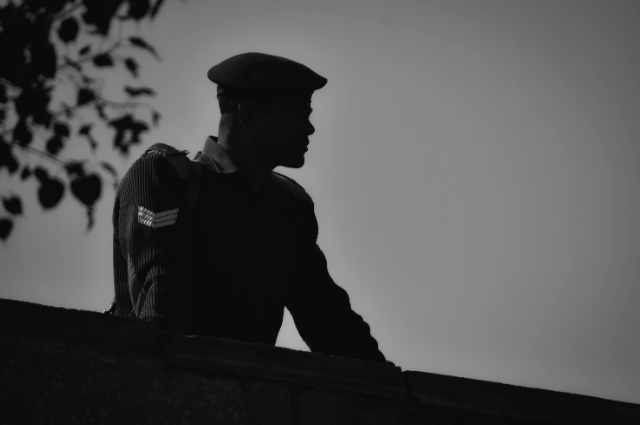
The world woke up to love that day—roses wrapped in satin ribbons, lovers exchanging whispered promises, the warmth of candlelit dinners illuminating hopeful faces. Valentine’s Day was in the air, filling every heart with the sweetness of togetherness. But on a road far from home, love took a different form. It was not wrapped in chocolates or adorned with poetry—it was worn like a badge, heavy with responsibility, stitched into the fabric of a soldier’s heart.
That morning, he laced his boots tighter, adjusted his uniform, and checked his rifle—his silent companion in both peace and war. The sky was painted in hues of gold and crimson, a quiet witness to his unwavering resolve. He had woken up to a message on his phone—“Happy Valentine’s Day, my love. Come home soon.” He smiled at the thought of her, of the way she would wait by the window, counting the days until his return. Somewhere, a mother whispered a prayer, lighting a lamp, asking the heavens to keep her son safe. A little girl, barely old enough to understand distances, eagerly awaited her father’s voice on the phone, planning the games they would play when he came back.
The convoy rolled forward, engines humming like a heartbeat, a rhythm of duty and sacrifice. Inside the bus, laughter echoed between conversations—some about family, some about the past, some about the simple joys they longed for. They spoke of home-cooked meals, of childhood streets, of the love that awaited them beyond the borders of their service. But woven between their words was something unspoken—a silent understanding that not all of them would always return.
And then, in a fraction of a second, love turned into fire. A deafening explosion shattered the peace, flames engulfed metal, and smoke rose like a mourning veil over the highway. The bus was no longer a carrier of dreams; it had become a graveyard of unfinished stories. The laughter was silenced, the hands that once held weapons to protect were now lifeless, and the eyes that had shone with hope closed forever. The crimson that painted the day was no longer from roses—it was from the blood of forty brave hearts who had loved their nation more than themselves.
Far away, a phone rang endlessly in a quiet home, the call unanswered, the silence stretching into eternity. A wife stood by the window, staring at the empty road, still waiting for the return she had dreamt of. A mother held a framed photograph to her chest, her son’s face frozen in time, her prayers now whispers of grief. A child clutched a drawing in tiny hands—stick figures of a father and daughter, standing together, under a bright sun. But that sun had set forever.
That night, the world continued to celebrate love, but in forty homes, love had turned into longing. The letters remained unread, the gifts unopened, the last words left unspoken. But a soldier’s valentine is never about flowers or chocolates; it is about sacrifice, about giving without expecting, about loving a nation so deeply that even death cannot take that love away.
Even in their absence, their love remains. It lingers in the air, in the tricolor that flutters high, in the stories whispered by those who refuse to forget. It echoes in the silence of the night, in the blood-red sunsets, in the wind that carries their names forward—reminding the world that some loves are eternal, even beyond life itself.
